Before Coors and humidors, JAWS and WAR, Larry Walker was just a late-season call-up hoping to make a difference for his team. Walker’s career as it pertains to the Hall of Fame has been well-covered, but what was the conversation like 30 years ago when the young Canadian first appeared for the Montreal Expos?
Walker’s major league debut came versus the visiting San Francisco Giants on August 16th, 1989. We are able to watch the game today thanks to a video that combines parts of the CTV broadcast and the French-language CBC feed.
CTV’s presentation was fronted by David Van Horne and former Expos right fielder Ken Singleton. Note from the future: Singleton’s 127 OPS+ with Montreal would be more or less matched by Walker’s 128 figure with the club.
The lead story on the broadcast was Montreal’s decline in the divisional standings, the team having let a three game lead on July 24th turn into a four game deficit entering August 16th, with three National League East clubs passing Les Expos.
The visiting Giants were faring much better, the NL West leaders featuring the fearsome twosome of Kevin Mitchell and Will Clark. The “Pacific Sock Connection” were in the process of slugging their way to a one-two finish in the NL MVP race. CTV were obviously keen to catch up with the dynamic first baseman Clark. Let’s check in on that interview.
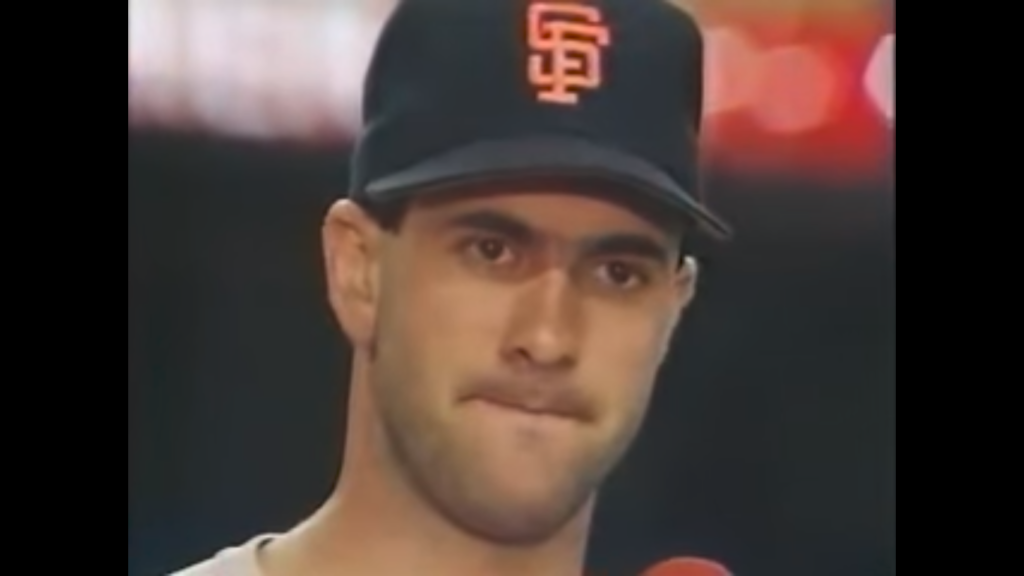
Pure charisma.
For the home team there was much anticipation about the debut of a 22-year-old from Maple Ridge, British Columbia. Larry Walker had been hoped to be the starting right fielder heading into the 1988 season, the youngster having put up impressive numbers in Single and Double-A ball. Those plans would drastically change in January of that year when Walker tore his right knee at home plate while playing winter ball in Mexico. The injury cost Walker the entire 1988 season, and Montreal would react by shifting two-time Silver Slugger shortstop Hubie Brooks to right field, a position Brooks maintained in 1989.
By the time of Walker’s Expos debut, Brooks’ production had dropped to levels that would be acceptable for a shortstop, but less so for a corner outfielder. The party line was that Walker and Brooks would be platooned for the rest of the season. Singleton speculated that Walker’s promotion could springboard Brooks into an improved performance. Expos manager Buck Rodgers hoped that Brooks would get jump started for the stretch run.
As for Walker, he was set to become the fifth Canadian to play for the Expos. His bat had played well at Triple-A, but arguably more important were his 36 stolen bases in Indianapolis, a figure that led the American Association and indicated a well-recovered right knee.
In a pre-game interview Walker revealed he was pretty tired from the travel but, echoing Crash Davis, “happy to be here”.
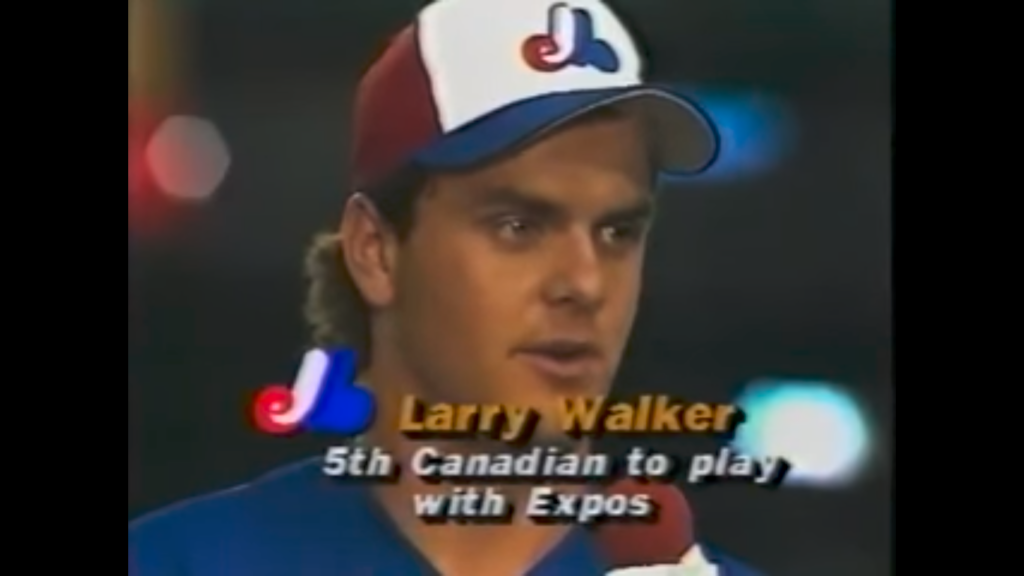
The feelgood story of Walker overcoming injury to reach the majors contrasted with the devastating events of the previous day’s game. San Francisco pitcher Dave Dravecky, who had undergone surgery to remove a cancerous tumor in his pitching arm the previous off-season, fractured his humerus while pitching to Tim Raines in just his second start back in the majors. It would be the final appearance of his baseball career.
With righty Mike LaCoss on the mound for San Francisco, Walker jumped straight into the lineup, batting sixth and manning right field. His first fielding opportunity was a simple corralling of a Will Clark single in the first inning. Before Walker came to the plate in the second inning, TV viewers were encouraged to answer the trivia question of the day…
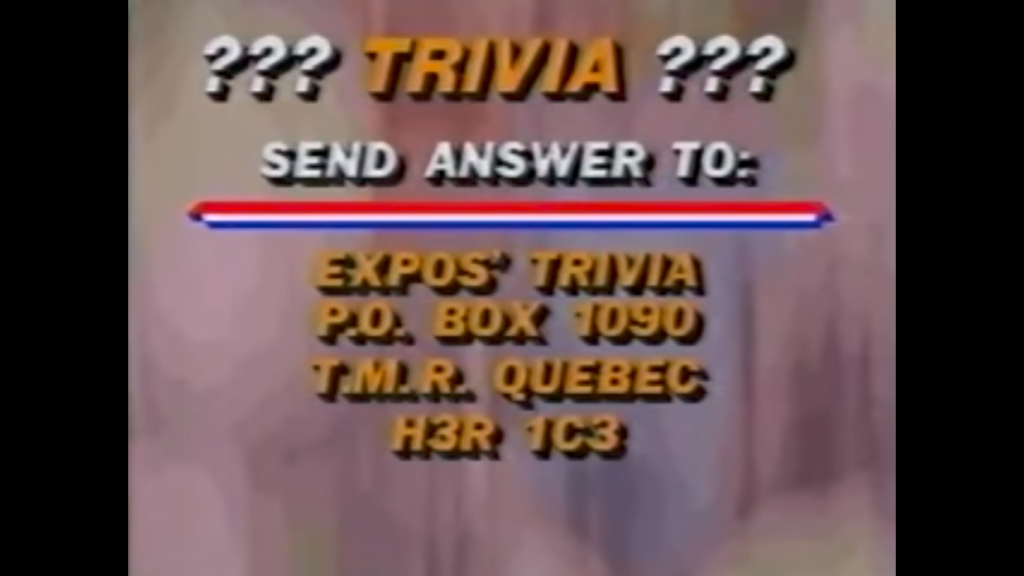
…by mail. The prize was a VHS tape. File this under things millennials wouldn’t understand.
A decent reception from the crowd greeted Walker. Ken Singleton and Dave Van Horne talked up Walker’s power-speed combo, noting that he was one of only four players with 20 home and 20 stolen bases in Double-A in 1987.
Facing LaCoss, Walker took the first pitch outside before swinging at four consecutive offerings, fouling off three and whiffing at one. Behind in the count 1-2, Walker then showed composure to take three consecutive balls, casually flipping his bat towards the dugout on his way to first. Van Horne noted that Walker had displayed the “patience of a veteran”.
Waiting for Walker at first base was Will “the Thrill” Clark. A perpetual MVP candidate beside the kid who had yet to hit a fair ball in the majors. Their careers would prove more similar than they might have imagined in that moment. Clark would finish with career figures of 8283 PA and a 137 OPS+ while Walker totaled 8030 PA and a 141 OPS+. Both players remained great hitters to the end and both would bow out of baseball after losing an NLCS with the St Louis Cardinals.
In that moment, with Walker standing at first for the first time in his career, it would have seemed so unlikely that Will Clark would appear on a solitary Hall of Fame ballot, while Walker would still be flirting with induction fourteen years after retirement.
Walker’s presence on the basepaths was not going unnoticed by San Francisco’s defense. LaCoss threw to first five times in the inning and manager Roger Craig, never adverse to pitchouts, put that play on with the count at 2-2 on Spike Owen. Walker was not to be caught out, but neither would he record a stolen base.
Kevin Mitchell led off the fourth inning for the Giants. Van Horne quoted Craig: “When [Mitchell] hits them, the outfielders don’t even move. Only the fans move.” In a literal sense, Craig’s dictum did not come true. Mitchell merely slugged a homer that center fielder Dave Martinez did chase, to a part of the stadium with no fan seating. Minor details. Mitchell had given the Giants a 1-0 lead.
In the bottom of the inning Walker got another chance to demonstrate the aptness of his name, working a 3-0 count, taking a called strike, then watching ball four go by for his second walk of the game. Singleton again praised Walker’s eye and patience at the plate. Still alert to the rookie’s ability on the basepaths, LaCoss threw to first twice in the subsequent at bat.
LaCoss had now issued five walks in the game but had yet to surrender a hit – a fact that Van Horne was happy to mention throughout the broadcast, no doubt incurring the wrath of social media users of the day. Montreal’s first hit finally came in the sixth inning, but to no run-scoring effect.
In the seventh Candy Maldonado repeated Mitchell’s lead-off home run stratagem, giving San Francisco a 2-0 lead. Walker was the first batter after the seventh inning stretch. In contrast to his previous plate appearances Walker jumped on the first pitch, sending the outside offering to left field for a lead off single and the first hit of his major league career. The home fans gave Walker a warm ovation. Will Clark was seen gesturing for the ball, the souvenir eventually arriving safely in the hands of Tim Wallach in the Expos dugout.
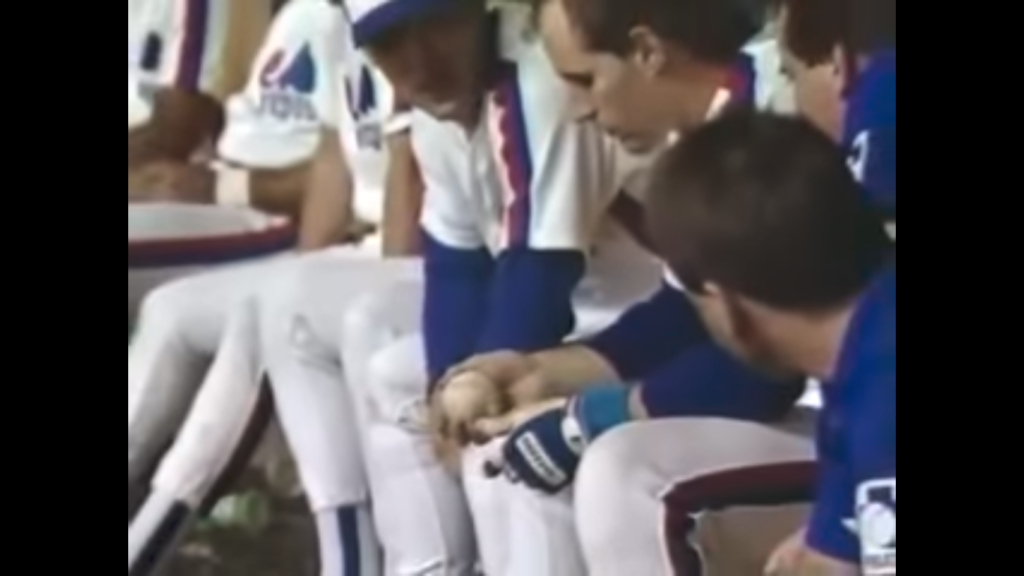
There was little time for self-congratulation on the part of Walker, as a passed ball immediately sent him to second. Two batters later he was singled home for the Expos’ first run of the game. High fives and attaboys followed.
Both halves of the eighth saw Walker playing a central role. With the game still a one-run affair and Kevin Mitchell on first, Matt Williams hit a line drive to right field. Unfortunately for the Giants, the ball headed directly for the rookie right fielder’s glove. Doubly unfortunately, Mitchell was rounding second base as the ball was caught, the hit-and-run play coming back to bite Roger Craig. Mitchell had been dissuaded from heading back to first through some excellent dekesmanship by second baseman Tom Foley.
Matt Williams, 23 going on 43, couldn’t believe it.
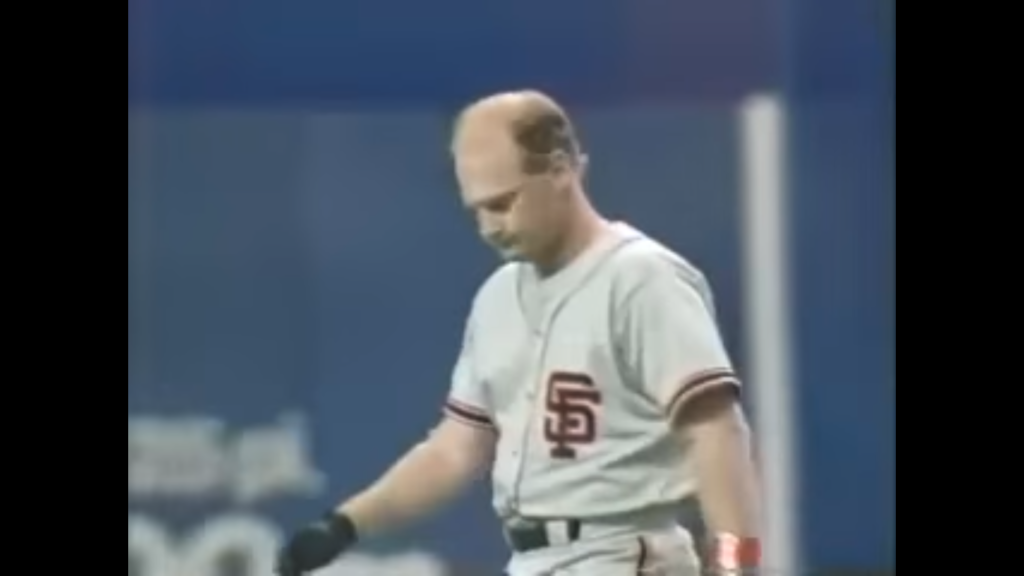
Down by one, the Expos rallied in the bottom of the eighth. Two quick outs were followed by a Raines double. Steve Bedrosian entered the game in relief. Wallach walked while Walker waited (try saying that even at normal speed), meaning two runners were on base for the debutant. On the second pitch of Walker’s PA, Raines did what Raines does and stole third. Walker again worked a 3-0 count, eventually walking on the sixth pitch of the plate appearance.
It was Walker’s fourth time on base in the game and he had yet to be put out. It was the first time in a quarter of a century that a National Leaguer had come to the plate at least four times in their debut and reached base on every occasion. Including Walker, this particular feat has only been achieved by 23 major leaguers since 1908 (most recently by Jay Bruce in 2008).
The bases were thus loaded for catcher Santovenia. A tense at bat looked to have ended disfavorably for the home side after Santovenia popped a shallow fly to center right. But Candy Maldonado misplayed his slide, the ball cannoning off his glove and beyond the immediate reach of center fielder Brett Butler.
Walker, running on the pitch, had been motoring around second as the error occurred, giving no indication that the brace worn around his right knee was giving him any issues. Walker beat the throw home, the bases now completely empty of its former occupants. Montreal had taken a 4-2 lead, and the attaboys and high fives were even more enthusiastic.
Montreal would close out the game in the ninth, Walker recording another simple putout in the process. As the team celebrated post-game, the camera lingered on the Expos newest star. A bullpen cart in the form of a boat passed by in the distance.
The win was Buck Rodgers’ 400th as Expos manager and doubled as a birthday present for the just-turned 51-year-old. Rodgers praised Walker performance, noting that the young man had every right to be nervous but had played a very good game. The French-language broadcast named Walker the Expos’ player of the game.
Walker’s debut was something of a false dawn, at least as far as 1989 was concerned. He started six of the team’s next seven games, all against right handed starting pitching. But in the final game of that stretch Walker went 1-7 in a 22-inning epic against the Dodgers. Walker made a great catch in that game, but was also called out for leaving third base early when attempting to score on a sacrifice fly, costing Montreal the win.
Walker was out of the starting lineup for the next game, despite a righty being on the mound, and would start only four games in September as Hubie Brooks went on a tear. Walker’s opening salvo of 6-9 with four walks would be drowned out by a 2-38 tailspin to close out the season.
The Expos slumped to a 81-81 record, going 16-27 after Walker’s call-up. Montreal kept their faith in the youngster, handing Walker the starting right field spot for 1990.
In a sense the rest is history, but with one more year of waiting to see if Walker will be elected to the Hall of Fame, that history continues to feel very present.
